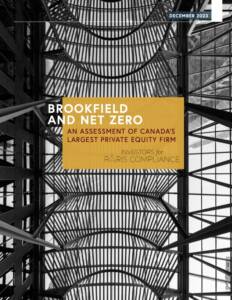In May 2021, Brookfield Corporation committed to net zero financed emissions by 2050 across its $850 billion AUM. The firm is considered a climate leader in private equity, bolstered by the presence of its Head of Transition Investing, Mark Carney.
This report is the first-ever in-depth, independent evaluation of Brookfield’s net zero work. It is supported by emissions estimates, calculated by research group Private Equity Climate Risks, which suggest Brookfield’s emissions may be an order of magnitude greater than its current disclosures.
Carney, also the co-Chair of the Glasgow Financial Alliance for Net Zero and the ex-Governor of the Bank of Canada and of the Bank of England, has been outspoken regarding the need for ambitious governmental intervention in addressing the climate crisis. He has given speeches on the fundamental intersection between climate policy and macroeconomic policy, and has advocated in favour of escalating carbon taxes.
In regards to Brookfield’s Global Transition Funds, Carney, stated:
“With the global carbon budget being rapidly run down, now is the time for comprehensive, determined action….This Fund provides significant scale of capital with catalytic long-term investment the world needs to help put our planet on a sustainable net-zero pathway.”
However, despite its net zero commitment, Brookfield continues to invest in hundreds of fossil fuel assets.
Institutional investors are seeking investment opportunities that align with net zero emissions goals, but Brookfield may not yet be the panacea.




